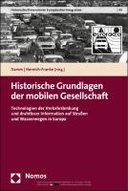Explore

Historische Grundlagen der mobilen Gesellschaft
0 Ungluers have
Faved this Work
Login to Fave
Modern Europeans are mobile. Cars in particular have made European societies mobile since the 1960s, but, at the same time, mobile Europeans experience their immobility every day when they get stuck in one of countless traffic jams. The reduction of immobility has therefore been a major scientific and societal challenge since the beginning of mass mobility, in order to minimise its negative consequences, such as individual time loss or economic damage. This volume addresses these challenges by bringing together interdisciplinary approaches to researching the history of traffic information systems as instruments of congestion avoidance and traffic control. It addresses the developmental processes, designs and designers of such systems from traffic radio to digital navigation.With contributions byKatja Berg, Fritz Bolte, Weert Canzler, Christoph Classen, Veit Damm, Jens-Ivo Engels, Manfred Grieger, Christian Henrich-Franke, Thomas Kusche-Knežević, Rüdiger Malfeld, Oliver Michler, Marco Secci and Jörg Wehling.
This book is included in DOAB.
Why read this book? Have your say.
You must be logged in to comment.
Rights Information
Are you the author or publisher of this work? If so, you can claim it as yours by registering as an Unglue.it rights holder.Downloads
This work has been downloaded 13 times via unglue.it ebook links.
- 13 - pdf (CC BY) at Unglue.it.
Keywords
- digitale Mobilität Fahrzeugkommunikation Navigation Navigationssystem Verkehr Verkehrspolitik Grenzüberschreitende Zusammenarbeit Mobilität Verkehrsgeschichte Europäische Integration
Links
DOI: 10.5771/9783748937289Editions

